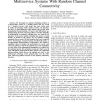Free Online Productivity Tools
i2Speak
i2Symbol
i2OCR
iTex2Img
iWeb2Print
iWeb2Shot
i2Type
iPdf2Split
iPdf2Merge
i2Bopomofo
i2Arabic
i2Style
i2Image
i2PDF
iLatex2Rtf
Sci2ools
118
click to vote
GLOBECOM
2009
IEEE
2009
IEEE
Optimal Resource Scheduling in Wireless Multiservice Systems with Random Channel Connectivity
We investigate an optimal scheduling problem in a discrete-time system of L parallel queues that are served by K identical servers. This model has been widely used in studies of emerging 3G/4G wireless systems. We introduce the class of Most Balancing (MB) policies and provide their mathematical characterization. We prove that MB policies are optimal among all work conserving policies; we define optimality as minimization, in stochastic ordering sense, of a range of cost functions of the queue lengths, including the process of total number of packets in the system. We use dynamic coupling arguments for our proof. We also introduce the Least Connected Server First/Longest Connected Queue (LCSF/LCQ) policy as an approximate implementation of MB policies. We conduct a simulation study to compare the performance of several work conserving policies to that of the optimal one. In the simulations we relax some of the mathematical assumptions we required for the analytical proofs. The simulati...
Communications | GLOBECOM 2009 | MB Policies | Optimal Scheduling Problem | Work Conserving Policies |
Related Content
| Added | 16 Aug 2010 |
| Updated | 16 Aug 2010 |
| Type | Conference |
| Year | 2009 |
| Where | GLOBECOM |
| Authors | Hussein Al-Zubaidy, Ioannis Lambadaris, Ioannis Viniotis |
Comments (0)

